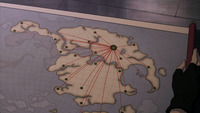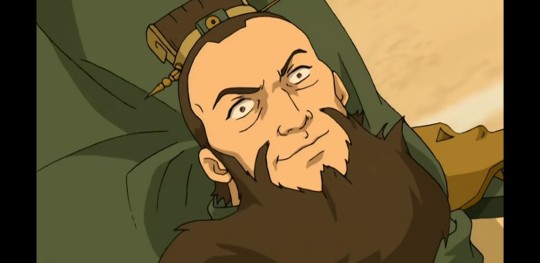#comes from ba sing se teachings towards their perception of a king
Text
The EK military feels so disconnected and unsociable towards their own people, despite coming from relatively warm and unorthodox communities (ie. Haru's village, Omashu) so I had an little theory that Ba Sing Se is a cause for this, and that they've been instilling their values ie. nationalism, xenophobia, classism and authoritarianism by spreading their influence throughout the EK military and governments.
There's no denying the sort of influence BSS has over other city-states and villages. The mail is under military control and was shown being taken advantage of, as important letters to the Gaang were intercepted by Long Feng. We also see in the show a map of Ba Sing Se's military forces sent to every major fortress in the EK.

These fortresses also double as training camps, and it's established by the games that it's common to send EK children to these camps once they're old enough. The only training camp we see in show is the fortress under General Fong's command and we all know how he is:

In the games, the Consul's background is unknown but his character was written like a precursor to Long Feng, with similarities such as "maintaining" EK traditions as an excuse for discrimination, manipulating the king as an advisor, secretly controlling the guards of the city, and ultimately selling their kingdom out over their obsession for power. My first impression of the Consul was that he was an envoy sent from Ba Sing Se, as a method to control other governments, and he's just a particular case that went off the rails. While General Fong and the Consul have unknown origins and are unconfirmed to be associated with Ba Sing Se, their values and actions align with Long Feng's policies.
Because of the way the EK governments and military are set up during the war, the result is EK children being indoctrinated by Ba Sing Se's styled nationalism, xenophobia, classism, etc, and them returning to their hometowns only to become detached and persecuting towards the people they were supposed to protect.
#this post came out from talking to one of the omashu guards#who was so shocked at the idea of not following rules to the letter all the time#and it's like how did he ever become king bumi's guard#guard of mr encourages everyone to break his own laws for the fun of it??#and it becomes a question who instilled these values into him then#if their home is omashu and should know how the king operates now?#perhaps some the intense deference towards the king that doesn't vibe with Bumi#comes from ba sing se teachings towards their perception of a king#no wonder bumi forces his guards to put on plays and lighten up a bit#atla#atla the game (2006)#omashu#general fong#game sense
60 notes
·
View notes
Text
Zuko

You asked for it....
Zuko, also known as the traitorous prince of the Fire-Nation In Avatar the Last Airbender, is a well-developed example of a character with a redemption arc, but he is also much more than that. Simply, Zuko’s trials and tribulations are an incredible way to show the audience his development. This short narrative will present why Zuko is such a good and everlasting character.
Zuko as a child was raised by his mother, Ursa, and his father Ozai. What is interesting about these two being his parents is the clear difference in perspective as well as moral values. If one examines the flashbacks that Zuko has throughout the series, one can notice that Ursa is the one to usually praise Zuko for kind and loving behavior, and chastises Azula for the behavior she displays. On the other hand, Ozai constantly praises Azula for the same behavior that her mother criticizes and scolds Zuko for the behavior that Ursa praises. In development, children are learning from their parents what is acceptable behavior, so it would be natural for the child to latch on to the parent that praises them more because it is a positive experience. Zuko’s positive reinforcement as a child from his mother for doing actions that are generally perceived as good lead to Zuko’s inevitable conflict with his father. There is no way that Zuko would have not had a conflict with Ozai because Zuko did and always will believe his mother’s morals as truths because he was positively reinforced when he showed those same values. This also goes for Azula since she received most of her positive reinforcement from her father, it is natural for that to develop into resentment towards her mother. This leads to a secondary point of why Azula and Zuko were so competitive as children, since each one was receiving scorn from one parent or the other they felt like they had to fight and pry for the attention of both. Azula’s form of getting her mother’s attention was lashing out, and Zuko’s was trying to live up to his father’s expectation. Therefore, from Zuko’s childhood flashbacks alone we can determine why Zuko would have an inherent inner moral conflict, since he was raised by his mother who taught him the opposite values of his father, but at the same time longing for the affection of his father. This is why Zuko is so morally complex.
Moving on to Zuko from the time his mother left to the time that Zuko was banished we see a clear change in motivation for Zuko. Since Zuko’s mother is no longer in the picture, Zuko is left only with the one parent who constantly scorned him as a child. Therefore, Zuko’s only current motivation is to try and gain his father’s approval. Since there is no one there to reassure him that he is just as good as Azula, just in a different way, Zuko now places all his bets on trying to get his father to praise him, because he felt like the one major force of support in his life abandoned him, so obviously something must be wrong with him. This is rational thinking to a child experiencing abandonment issues, especially since he was never told why his mother left.
Now that Zuko’s main goal is to get approval from his father, he is doomed to fail. This is because, as discussed previously, Zuko was raised on a different moral path then what his father had wanted, and therefore can NEVER be fully aligned with his father. This large difference in perspective will lead to conflict between the two inevitably because Ozai has a need for control over those around him. This is frequently displayed in the series since he actively seeks to be seen as higher than everyone, even his own children and father. This is also shown when Ozai burns and banishes Zuko because most reasonable adults would not feel threatened at the words of a thirteen year old, but Ozai did because he has a delusion that anyone who disagrees with him is against him. This is also shown to be a trait that Azula inherits because when she is left to control the Fire Nation herself she ends up banishing everyone who says even the smallest remark against her wishes, even when it is about her own well-being due to the delusion that her mother made people betray her. This is because Azula feels that neither her father nor her mother loved her, whereas Zuko knows that his mother loved him.
When Zuko has his morality sickness in Ba Sing Se after releasing Appa we come to understand just how deep rooted the conflicting narrative must be for him in his own head. On one end he most likely has his mother and uncle’s teachings praising him for rescuing Appa and helping the world towards peace, but on the other he has the part of his father and his sister who he knew viewed this type of act as a sign of weakness. This would not be so much of an issue if Zuko did not actively wish for the approval of his father, and his father’s love.
Zuko’s change in perspective that leads him to join the avatar is a crucial one. When Zuko starts out in season one he was sent on a mission that Ozai had believed he would never achieve, but Zuko was naive and took the bait because he would do anything to be seen as good in his father’s eyes at the time. Then we move to in season 2 where Zuko begins to learn of just how vastly different things are without him having the constant intrusive Ozai in his life and controlling him since Iroh is showing him the nature of people’s lives outside the reach of his father. When Zuko departs from his uncle and travels through the Earth Kingdom alone, he begins to learn that his father did not only hurt him, but other people. Innocent people. This is important to note because to Zuko, he is not innocent, and when his father burned him and banished him he fully believed that the action was deserved, and that his father’s cruelty was his fault. We can tell this because even though Zuko has his uncle to tell him that he doesn’t need his father’s approval, Zuko refuses to believe it, and chases the Avatar like a bloodhound. He, in season one especially, took Ozai’s perception of him and viewed it as the truth. This is why Iroh’s quote, "IT'S TIME FOR YOU TO LOOK INWARD AND START ASKING YOURSELF THE BIG QUESTION: WHO ARE YOU AND WHAT DO YOU WANT?" Is so drastically important to Zuko’s development, because at his stages between season one and two, Zuko’s only concept of himself is who he longs to be in his father’s eyes.
Zuko is such a great and in depth character because his growth and his conflicts are wound into him from his childhood like DNA. This is also why a huge part of Zuko’s story line revolves around destiny, because Zuko was DESTINED to go against his father from the pure fact that his morality and his perception clashed so severely with that of his father. Zuko is such a brilliant character because from the smallest of lines or the simplest of flashbacks we learn so much of why Zuko was bound to have a moral conflict and why he became the person he is when he reaches season 3 and joins Aang. In order to be who he truly was, Zuko had to abandon his title as the prince, and his title as Zuko so he could begin to learn who he really is with no labels, and no expectations attached. Zuko is the man he is in season 3 because of his mother and Iroh’s teachings, and his journey as someone who had no expectations held to them (this is talking about him being ‘Lee’ for a majority of his time in the Earth Kingdom). When Zuko declares his name in the small town he was in in “Zuko Alone” this is when he finally starts to separate his father’s vision of himself, and who he truly is.
@king-of-the-dots
#atla#atla rewatch#zuko#azula#character study#avatar the last airbender#avatar#avatar the last airbender aang#uncle iroh#long post
253 notes
·
View notes